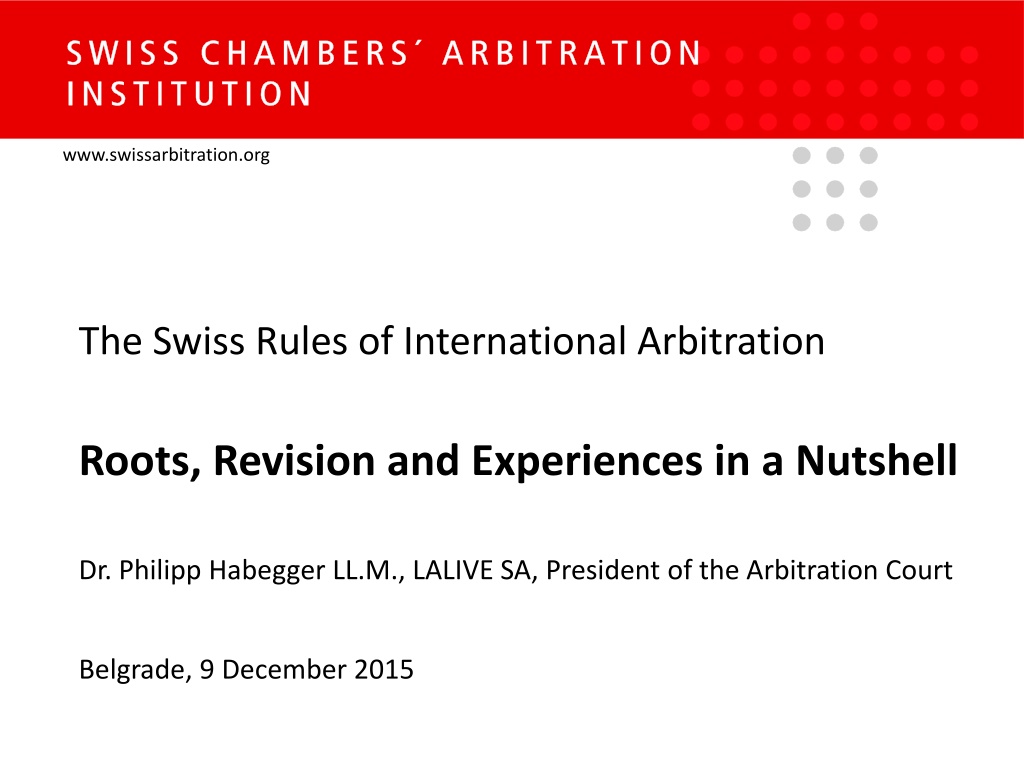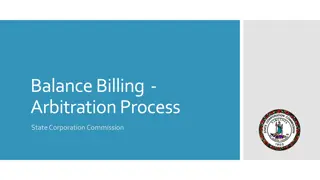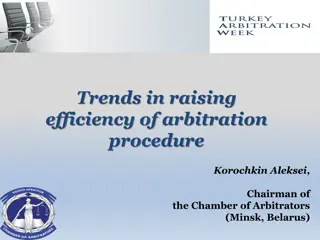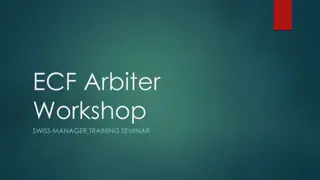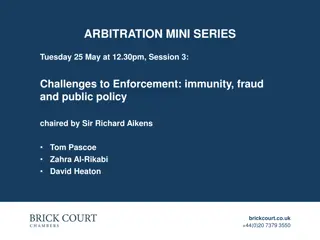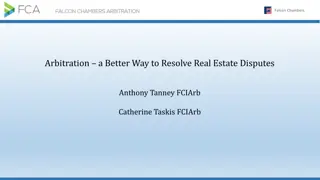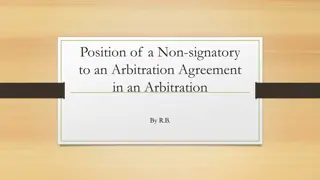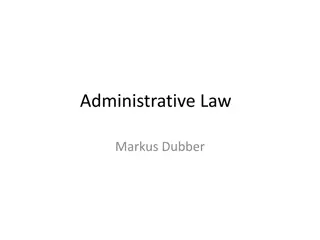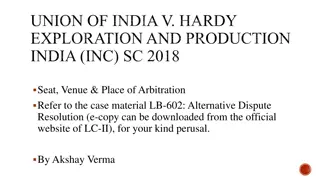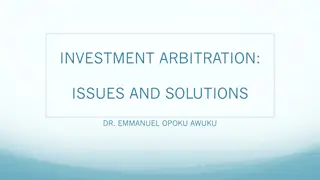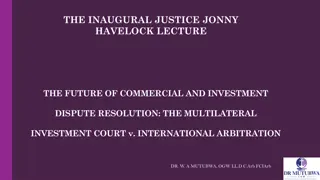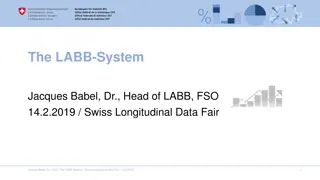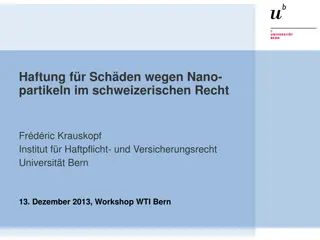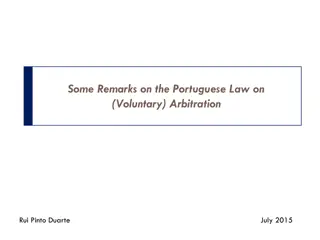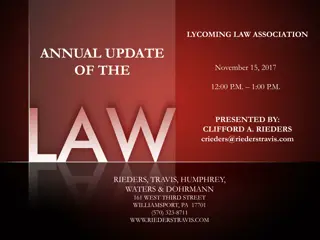Overview of the Swiss Rules of International Arbitration
The Swiss Rules of International Arbitration have evolved over the years to enhance efficiency, flexibility, and cost control in arbitral proceedings. The roots, revision, and experiences with these rules highlight the significant institutional changes and additions that reflect modern arbitration practices, strengthening the supervisory powers of arbitral institutions. Parties submitting disputes under these rules confer extensive powers on the arbitration court, ensuring smooth proceedings and addressing any shortcomings in tribunal formation.
Uploaded on Sep 20, 2024 | 0 Views
Download Presentation

Please find below an Image/Link to download the presentation.
The content on the website is provided AS IS for your information and personal use only. It may not be sold, licensed, or shared on other websites without obtaining consent from the author. Download presentation by click this link. If you encounter any issues during the download, it is possible that the publisher has removed the file from their server.
E N D
Presentation Transcript
www.swissarbitration.org The Swiss Rules of International Arbitration Roots, Revision and Experiences in a Nutshell Dr. Philipp Habegger LL.M., LALIVE SA, President of the Arbitration Court Belgrade, 9 December 2015
Swiss Rules: Roots, Revision and Experiences 1 2 Roots Strengthen the supervisory powers of the arbitral institution Accelerate the proceedings More flexibility for the arbitral tribunal Better control of the costs Emergency relief 3 4 5 6
Swiss Rules: Roots, Revision and Experiences 1 Swiss Rules of International Arbitration 2004 Swiss Rules of International Arbitration 2012; light revision which considered: UNCITRAL Arbitration Rules 2010 ICC Rules of Arbitration 2012 CEDR Rules for the Facilitation of Settlement in International Arbitration 2009 IBA Rules on the Taking of Evidence in International Arbitration 2010 AAA/ICDR 2009; SCC 2010; SIAC 2010 ICC Commission Techniques for Controlling Time and Costs in Arbitration 2007 Roots UNCITRAL Arbitration Rules 1976 Arbitration Rules Geneva Chamber of Commerce and Industry 2000 International Arbitration Rules Zurich Chamber of Commerce 1989 TI, VD, BS, BE
Swiss Rules: Roots, Revision and Experiences 1 Roots UNCITRAL Rules ad hoc Swiss Rules institutional changes and additions to adapt a set of ad hoc rules to institutional arbitration changes and additions reflecting modern practice, e.g. Art. 1(4): autonomy of the arbitral procedure Art. 4(1): consolidation Art. 4(2): joinder Art. 15(8): settlement facilitation Art. 26(3): ex parte interim relief Art. 42: expedited procedure Art. 43: emergency relief / arbitration
Swiss Rules: Roots, Revision and Experiences 2 Strengthen the supervisory powers of the arbitral institution
Swiss Rules: Roots, Revision and Experiences 2 Strengthen the supervisory powers of the arbitral institution By submitting their dispute to arbitration under these Rules, the parties confer on the Court, to the fullest extent permitted under the law applicable to the arbitration, all of the powers required for the purpose of supervising the arbitral proceedings otherwise vested in the competent judicial authority [...] (Art. 1(4)) In the event of any failure in the constitution of the arbitral tribunal under these Rules, the Court shall have all powers to address such failure [ ] (Art. 5(3))
Swiss Rules: Roots, Revision and Experiences 2 Strengthen the supervisory powers of the arbitral institution If the Respondent neither submits an Answer to the Notice of arbitration nor raises an objection to the arbitration being administered under these Rules, the Court shall administer the case, unless there is manifestly no agreement to arbitrate referring to these Rules (Art. 3(12)) Better control of the costs objective no. 5
Swiss Rules: Roots, Revision and Experiences 3 Accelerate the proceedings
Swiss Rules: Roots, Revision and Experiences 3 Accelerate the proceedings Time limit for the payment of the deposits of costs reduced to 15 days (Art. 41(4)) Now time limit of 15 days for the challenge of an arbitrator (Art. 11(1)) Now time limit of 15 days for the agreement on the challenge by all parties respectively the withdrawal by the arbitrator (Art. 11(2))
Swiss Rules: Roots, Revision and Experiences 4 More flexibility for the arbitral tribunal
Swiss Rules: Roots, Revision and Experiences 4 More flexibility for the arbitral tribunal All participants in the arbitral proceedings shall act in good faith, and make every efforts to contribute to the efficient conduct of the proceedings and to avoid unnecessary costs and delays. [...] (Art. 15(7)) may be taken into account in cost allocation (Art. 40(1+2)) With the agreement of each of the parties, the arbitral tribunal may take steps to facilitate the settlement of the dispute before it. Any such agreement by a party shall constitute a waiver of its right to challenge an arbitrator s impartiality based on the arbitrator s participation and knowledge acquired in taking the agreed steps (Art. 15(8)) Modification, suspension or termination of interim measures on the arbitral tribunal s own initiative (Art. 26(1)) Ex parte interim measures (Art. 26(3))
Swiss Rules: Roots, Revision and Experiences 4 More flexibility for the arbitral tribunal Consolidation, Art. 4(1) Joinder, Art. 4(2) Workshop II
Swiss Rules: Roots, Revision and Experiences 5 Better control of the costs
Swiss Rules: Roots, Revision and Experiences 5 Better control of the costs Before rendering an award [...], the arbitral tribunal shall submit to the Secretariat a draft thereof for approval or adjustment by the Court of the determination on costs [...]. Any such approval or adjustment shall be binding upon the arbitral tribunal (Art. 40(4)) The arbitral tribunal, [...] after consulting with the Court, shall request each party to deposit an equal amount as an advance for the costs [...] and the Administrative Costs [...] (Art. 41(1)) The Secretariat or, if so requested by the Secretariat, the arbitral tribunal, is to hold the deposits to be paid by the parties in a separate bank account which is solely used for, and clearly identified as relating to, the arbitral proceedings in question (Appendix B Sect. 4.1)
Swiss Rules: Roots, Revision and Experiences 5 Better control of the costs With the approval of the Court, part of the deposits may from time to time be released to each member of the arbitral tribunal as an advance on costs, as the arbitration progresses (Appendix B Sect. 4.2) [...] The Court shall issue general guidelines for the accounting of such expenses [i.e. the expenses of the arbitral tribunal and the emergency arbitrator] (Appendix B Sect. 3) https://www.swissarbitration.org/sa/download/guidelines_for_ arbitrators_2012.pdf
Swiss Rules: Roots, Revision and Experiences 5 Better control of the costs Better protection of the arbitrators: Reduction of the time limit for payment of deposits (Art. 41(4)) objective no. 3 acceleration Provisional deposit for expedited procedures (Art. 42(1)(a) and Appendix B Sect. 1.4) Specific deposit for emergency relief proceedings (Art. 43(1)(c) and Appendix B Sect. 1.6)
Swiss Rules: Roots, Revision and Experiences 6 Emergency relief
Swiss Rules: Roots, Revision and Experiences 6 Emergency relief (Art. 43 Swiss Rules) International trend Opting-out solution (Art. 43(1)), transitional regime Same effects as a decision of interim measures of protection made pursuant to Art. 26 (Art. 43(8)): May be rendered in the form of an interim award (>< ICC) Ex parte relief available (>< ICC; others) Emergency arbitrator to determine and allocate party costs if no arbitral tribunal is constituted (Art. 43(9); (>< ICC)
www.swissarbitration.org Thank You
